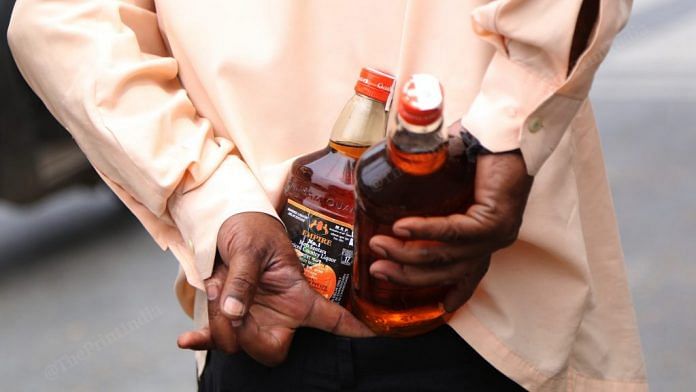One of the major factors behind the victory of Nitish Kumar-led JDU in the 2015 assembly election was Kumar’s emphasis on the prohibition of all types of liquor throughout Bihar. In order to fulfil his promise, his government came up with Bihar Prohibition and Excise Act 2016(BPEA), which came into effect in April 2016. According to the act, “no person shall manufacture, bottle, distribute, transport, collect, store, possess, purchase, sell or consume any intoxicant or liquor.”
The main objective of the law was to:
- Curtail the consumption of alcohol in society, due to its hazardous impact.
2. Reduce the cases of domestic violence against women.
In this article, I am going to analyse whether the objective of BPEA has been achieved in the last five years, and if there is any efficient alternative to the strict law.
I am using data from National Family Health Surveys (NFHS) to compare the level of variables in three periods—before the establishment of law, in the year of establishment, and five years after it came into force.
According to NFHS data, 34.9% of men in Bihar used to consume alcohol in 2005-06, which reduced to 28.9% in 2015-16, and further to 15.5% in 2019-20. So, it can be observed that the consumption of alcohol was already falling among men, without any ban on alcohol. This shows that the prohibition act has hardly influenced the consumption culture in Bihar.
From the latest NFHS data, I also observed the consumption trend in West Bengal and Maharashtra, which are not dry states. Among the adults aged between 15-49 years, 13% of men drink alcohol in West Bengal, while for Maharashtra it’s 13.9% for men. So, we can see these states have low consumption of alcohol compared to Bihar, even without any prohibition law. It shows that there is something else that influences the demand for alcohol.
According to NFHS data 2005-06, 59% of married women suffered from spousal violence, which remarkably reduced by 15.3% to 43.7% in 2015-16 and it further reduced to 40.6% in 2019-20. While spousal violence may have a correlation to the consumption of alcohol, but the point is that is a prohibition law necessary to prevent it? It can be observed that without any law prohibiting alcohol consumption, spousal violence fell by 15.3%. This is why I say there is something else that can curtail domestic violence.
Does alcohol prohibition law work?
The demand for alcohol is inelastic, and by that I mean, whatever be the price of alcohol, we can always find a crowd at every beer shop. So, when a law is established prohibiting manufacturing or sale of alcohol, it impacts the supply side of the market. Basically, a law like BPEA hardly influences the demand side of the market, which is inelastic in nature. The result is that, in a new market equilibrium, there is negligible reduction in the consumption of alcohol, but the price of alcohol rises. It can be said that the law can actually worsen the lives of families of alcohol addicts, instead of making them better off.
Prohibitory laws cannot alter the demand side of the alcohol market. Instead of making laws, the government should work towards something that would influence the demand side of the consumer. One alternative is to disseminate awareness among people at the village or panchayat level. Awareness drives can help in reducing the demand.
Mere law passed in an assembly by a few people can’t bring social change. Despite the law, nearly 123 people have died after consuming spurious liquor, and hundreds of people behind the bars. This law has produced hundreds of drug peddlers, but it has hardly brought any social change. If the government would have spent just 50% of the revenue it receives from the duties on alcohol on educating people about the hazardous effects of alcohol, it could have brought better change in comparison to what I see in Bihar today.
The author is a student at Indira Gandhi Institute Of Development Research, Mumbai. Views are personal.




